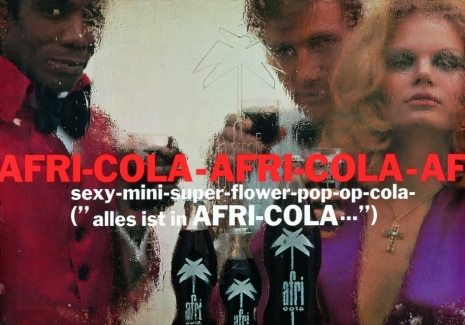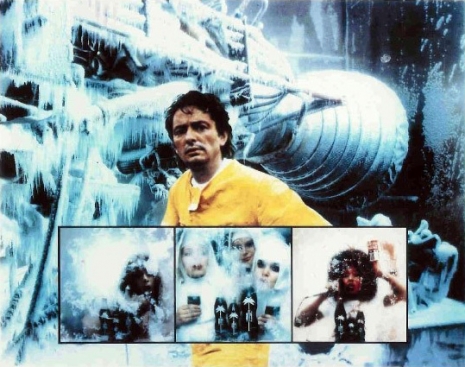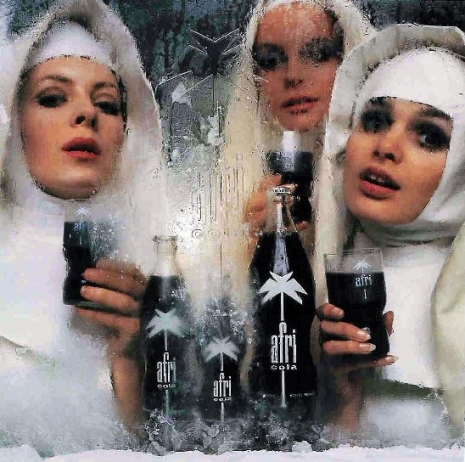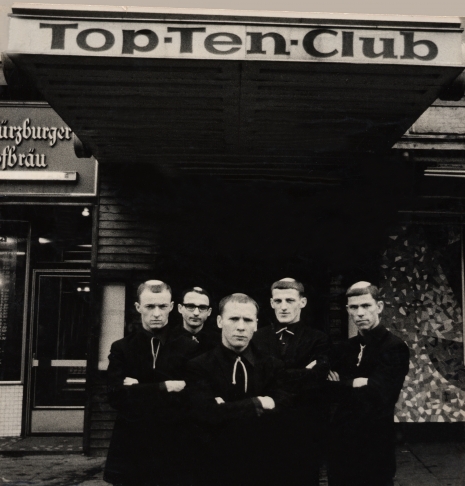
The Monks in front of the Top Ten Club in Hamburg, Germany
Third Man Records have announced an amazing upcoming release: Five tracks recorded by fabled mid-60s avant-garage punks The Monks (often stylized as just ‘monks’) around the same time as their final single “Love Can Tame The Wild” in early 1967. The lead-off number “I’m Watching You” gets its world premiere here today, courtesy of the label.
The other four tracks on the Hamburg Recordings, 1967 EP were laid down at a studio located on the premises of the Top Ten Club, one of the early rock ‘n’ roll venues in Germany where the young Beatles played one of their famed Hamburg residencies. But these songs aren’t just some forgotten cast-offs, they are as vital and as punchy as everything else the Monks recorded.
Over email, I asked Monks bass player Eddie Shaw about the session and got this extraordinary reply, which I hope our readers will find as interesting as I did:
THIS WAS THE LAST RECORDING SESSION before the Monks broke up…
Between late 1965 until the Fall of 1967, we had four different engagements at the Top Ten Club—located on the Reeperbahn in Hamburg. It was the same club the Beatles worked when they first came to Hamburg. Each booking was for a month. We performed 9:00 pm to 3:00 am, seven nights a week, with a two-hour afternoon matinee on Sundays. Life in Hamburg, as we knew it, revolved around the tough St. Pauli district and the intense hours onstage. In fact, our first month’s booking, as Monks, was in the Top Ten Club and almost two years later, our next to last Monks’ booking was in the same place. The audience in the club was made up of people who liked the Beatles and people who liked the Monks. The Beatles sang nice songs and the Monks sang “I Hate You But Call Me.” Tony Sheridan, who recorded “My Bonnie Lies Over The Ocean” with the Beatles, was there many nights, in front of the stage, shouting at us and telling us how much he hated us. When we were there, the club was packed every night.
During our last month at the Top Ten Club, Ricky Barnes, the club manager, surprised us by revealing a window, on a side wall of the club, with a recording studio control room behind it. “I also produce recordings,” he said.“Do you guys want to do some tracks?” Being astonished by this news—and as our contract with Polydor had just come to an end—we agreed. Polydor was putting pressure on us to soften our style saying, “Soft Rock is the future.” At this point, after many months of constant touring (sometimes performing in three different towns a day) we were tired and beginning to disagree with each other. As many groups do, we felt the pressure of writing and performing songs—“Monk Style”—that were beyond the pale of what groups normally played. And now a couple Monks hinted they wanted to go home.
With Ricky Barnes’s encouragement, we agreed to make one last recording effort, this time writing the songs in a more predictable style, a bit softer, trying to fit in with the mainstream tastes of the day. We had just begun to ignore our monks’ costumes, as well as grow out our hair, getting rid of the tonsure. Even as we were scheduled to go to Asia in two months, there was a feeling among us that the Monks might be coming to an end.
For a couple of mornings, after work—after 3:00 am—I had my amp set up in the tables area, where customers usually sat. At this hour, we were tired and a bit handicapped from the activities of the night - drinking between sets, taking the little pills that “Oma” (“Grandma”) provided so we could stay awake. She worked in the men’s restroom and, in the Beatles bios, they called her “Mom.”
We recorded until about seven or eight in the morning. On the second session, Dave, tired and in bad shape, vomited on the floor during one of the songs. That’s when Ricky Barnes stopped the tape and called me into the control room. “It’s time to call it quits,” he said and he took the tape off the machine, put it in a box and handed it to me. Two months later, a couple of days before going to Asia, the Monks disbanded.
Surprisingly, the tape reappeared a couple of years ago, and is now being released by Third Man Records. I was very happy to learn it still existed. One odd thing about it—there is a missing vocal track on one song, “Yellow Grass,” a tune about the gritty life we lived in Hamburg. I don’t know what happened to it and it doesn’t matter. It’s good to know the tape still exists. Hearing the recordings for the first time in many years, there were a few mistakes on a couple of tracks, which I helped correct in the mix, but overall it didn’t seem to be in real bad shape. Yes, the songs (all about relationships in Hamburg) are done in a softer style, but then they also are a significant piece of the Monks’ history. Dave played guitar instead of banjo, and I did a trumpet part on two songs while Gary played bass.
“I’m Watching You” was not recorded in the Top Ten Club. It was recorded earlier in February, at the Polydor Studios with the two songs on our last single recording, “Love Can Tame The Wild” and “He Went Down To The Sea”. It was not released, but does illustrate how the minimalist uberbeat style of the Monks was changing to accommodate Polydor Record’s requests for softer rock.
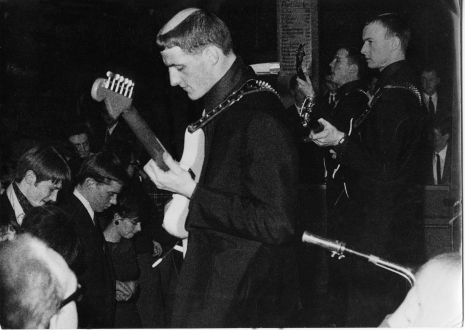
“Onstage at the Top Ten Club on a normal night with the audience keeping their heads down in reverent rockness.”
Ben Blackwell oversees vinyl record production at Third Man Records in Nashville and had this to say about the upcoming release:
“I’m Watching You” turned up first, as Gary Burger had actually obtained it as part of the collection of one of the Monks’ old managers who’d recently passed away, Walther Niemann. Gary visited Nashville a few years back and I showed him around, taking him to the pressing plant where they were coincidentally pressing copies of Black Monk Time when we walked in. After a solid time spent together, he pulled out a CD and played me “I’m Watching You” and I was gobsmacked.
From there Third Man worked very hard to try and coordinate a release of that song on a 7” but it just wasn’t meant to be. After Gary’s passing, both Eddie and myself asked his widow, Cindy, to see if there were any Monks tapes around. Eddie very clearly remembered all the details, song titles, lyrics, everything having to do with the sessions. After a bit of time, Cindy was able to find a couple of reels that contained multiple mixes of the songs that are now featured on the Third Man release. The tapes themselves were clean and we really didn’t have to go through any significant restoration process.
I still can’t believe we’re actually releasing a Monks record.
Listen to “I’m Watching You” after the jump…






